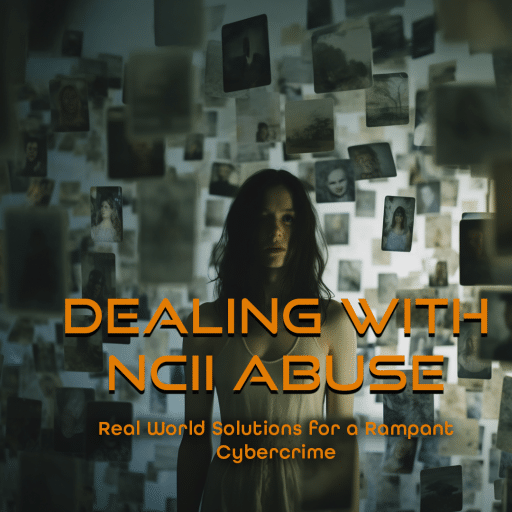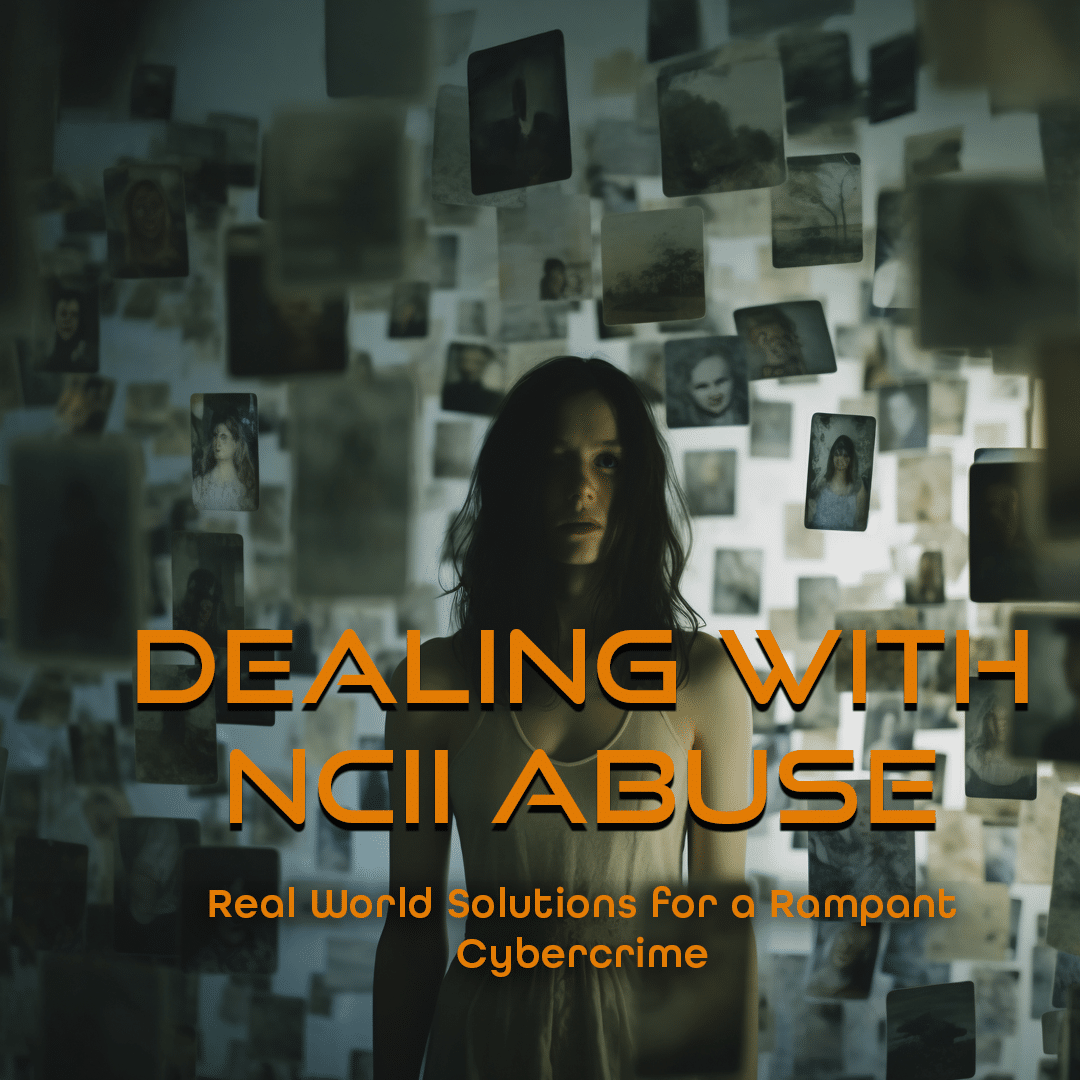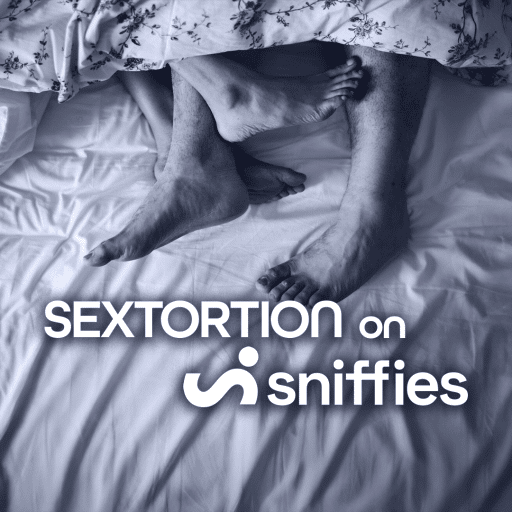As a cybersecurity company, we are constantly hearing every term under the sun associated with crimes involving the misuse of nudes and intimate content. While there are a variety names floating around the internet, they can all be stripped down to NCII abuse.
These crimes can take the form of online blackmail, extortion, or cyber harassment. The intended result can range from defamation to monetary gain. Regardless, there are ways in which you can prevent these issues from arising and take back control if they already have.
What is NCII Abuse.
Non-consensual Intimate Image abuse, or NCII abuse, is the distribution of explicit media without the authorization of the depicted party. The content in question can be acquired through an initially consented transaction, stolen without the victim’s knowledge, or even digitally manufactured.
The latter technique has become a growing issue in recent years with the development of AI technology being used to create deepfakes. Regardless of how the content is obtained, crimes involving NCII are becoming more commonplace worldwide.
The Revenge Porn Hotline has seen exponential rises in reported cases around NCII. In 2023, they received 18,426 total reports, a 106% increase from the prior year(1) and nearly 10,000 more reports than they received between 2015-2020(2).
As an umbrella term covering any form of cybercrime revolving around intimate media, NCII abuse can come in a variety of forms. Understanding the difference between these methods and their objective can help you avoid becoming a victim.

Common Crimes involving NCII
- Revenge Porn: Unauthorized disclosure of explicit content with the intent to cause distress to the depicted individual. This is typically done by a current or former romantic partner.
- Sextortion: The use of social engineering tactics to obtain intimate images as leverage to financially extort an individual.
- Deepfake Scams: Digitally created intimate media using the victim’s likeness. Deepfake content can also be used by the perpetrator to initiate the exchange of intimate content.
- Hacked or Stolen Content: Extracting sensitive content from an unwitting victim that can be used for online blackmail.
- Sexploitation: This is similar to sextortion, but the end goal is coercing the victim to disclose further intimate media or sexual favors.
The Difference Between NCII, Revenge Porn, & Sextortion.
NCII encompasses any crimes involving non-consensual intimate images, regardless of if they were shared and the intention for doing so. While this is integral to crimes such as revenge porn and sextortion, they are not interchangeable terms.
Revenge porn is often used synonymously with NCII, but they are not the same thing. The intent of this crime is to cause reputation damage, emotional distress, or to gain general control over the victim. Nudes are often leaked by a disgruntled partner or personal connection.
On the other hand, sextortion is non-consensual intimate image abuse with the intent to profit financially. The media can be created both willingly or unknowingly. Some ways in which this content can be created without permission are deepfakes and webcam hacking. Revenge porn leaks may also provide sextortionist with media they can use as leverage.
How Does NCII Abuse Happen?
While Non-consensual intimate image abuse can happen in a variety of ways, there are some consistent tactics that can tip off a potential threat. Knowing what to look for in these warning signs can make the difference in whether or not you fall victim.
Social Engineering on Digital Platforms:
Many scammers create false personas that are carefully crafted to lure in their targets. Using information available on your profile, they are able to assume the role of a prospective peer who shares your interests before asking for explicit content.
Even in private conversations, it is incredibly dangerous to exchange intimate media online. Once you relinquish this content to anybody, even someone you know, its potential reach is no longer within your control.
Hacking & Phishing:
A cybercriminal may reach out to you with some sort of offer, threat, or misleading identity attempting to get you to click a link containing malware. These links can give the hacker access to your device, including intimate photos that are stored on it.
If you use weak passwords or reuse the same one for multiple accounts, the hacker may be able to gain access to your accounts through brute force and access your data this way.
Public Wi-Fi & Data Breaches:
Sometimes the security vulnerability is the fault of a service provider. This is the case with situations where a scammer gains access to your information through public internet services or data breaches.
Insecure networks and websites can leave you at risk of being targeted in a cybercrime. This often occurs at hotels where numerous people are using the same Wi-Fi network. You can learn more by reading our article discussing the safety of hotel Wi-Fi.
Platforms where NCII Abuse Occurs
The most common outlets for distributing NCII are social media platforms and adult content websites. In a 2024 study, The European Journal of Criminology found that 52% of cases were carried out over social media, with 78% of them happening on either Facebook or Instagram(3).
Meta platforms have policies in place that prohibit NCII distribution as well as automated systems that detect activity patterns of accounts who participate in such activities(4). However, this isn’t the case across all platforms. For instance, Twitter requires manual reporting for violations to be removed(5).
What Should You Do If You’re a Victim of NCII Abuse?
If someone is leveraging your nude images to attack or extort you, you need to take action quickly. NCII abuse is a very serious situation, but remaining calm and taking the following steps can allow you to regain control and get your nudes off the internet.
Immediate Steps to Take if You Are a Victim.
- Do not engage with the perpetrator: You should cease communication with the cybercriminal while leaving the line open. Blocking them can be detrimental to the investigation and result in retaliation from the perpetrator.
- Document the evidence: Collect any accounts that have contacted you or posted your content and any threatening messages. You do not need to document your intimate photos as proof unless you are submitting them to a hash-based matching platform.
- Report to the platform: This can lead to your leaked nudes and the accounts that post them being removed, which can help protect you and others from future attacks. Online resources like StopNCII.org can help prevent reposts through hash-based matching.
How to Remove NCII Content Online
Understanding the resources at your disposal will increase your chances of getting your nudes off the internet and limiting their spread. The following methods will yield the best results:
- File a DMCA Takedown Request: Reports of posts containing NCII that are accompanied by a DMCA takedown notice have significantly better chances of being removed. A study by the University of Michigan found that all reports under DMCA were taken off Twitter within 25 hours, while no reports filed through the platform’s non-consensual nudity policy were removed(5).
- Work with Cybersecurity Firms: These organizations specialize in preventing and investing cybercrimes, including ones revolving around NCII. They have the technical know-how required to uncover perpetrators and help you take legal action. They can also detect security issues that leave you susceptible and help you avoid future attacks.
- Contact Google for De-Indexing: In 2015, Google announced an update to their policies which allows users to submit requests to have links containing NCII content from search results(6). In recent years, they have implemented hash-based matching that can prevent reuploading and AI programs that can detect similar content in cases involving minors(7).
Can You Take Legal Action for NCII Abuse?
Victims of NCII abuse have legal rights to seek justice and get their nude images taken offline. Understanding the laws pertaining to NCII and the methods for pursuing legal action are important when taking action to resolve the matter.
Laws Protecting Victims of NCII Abuse
Currently, non-consensual intimate image abuse is not illegal at the federal level. However, D.C and all states except for South Carolina have laws in place that criminalize the distribution of this media without consent(8).
However, distribution of NCII may soon become a federal offense. The ‘TAKE IT DOWN’ act would nationally prohibit distribution of both legitimate and deepfake NCII. The bill unanimously passed in the Senate and now awaits House approval(9).
Sextortion is illegal at both the federal and state level, but the laws have variance in verbiage and punishment. You can learn more about the legal definition and how it is criminalized around the country by reading our comprehensive sextortion guide and article on sextortion laws in the US.
In 2023, a Texas woman was awarded $1.2 billion dollars in damages after filing a revenge porn lawsuit against her former boyfriend, Marques Jackson. Jackson had leaked nudes she sent him on multiple social media platforms and adult content websites.
Additionally, he created a public Dropbox folder containing the content which he sent to her friends, family, and colleagues. Jackson identified the woman by providing her name, address, and images of her face.
It is also alleged that Jackson had unauthorized access to the woman’s phone, email, social media accounts, and security cameras around her mother’s house, allowing him to stalk her. He threatened her with the nude images, detailing the potential damage from them becoming public.
The woman’s legal council had initially asked for $100 million in damages. However, the court far surpassed that total, which her lawyers hope will deter others from becoming future perpetrators(10).
How to File a Complaint or Lawsuit.
If you are in a region where NCII abuse is a civil or criminal offense, you should take legal action. With any cybercrime, you should begin by filing a report with local police. Even if the crime is outside of their jurisdiction, this will be an important record for future legal proceedings.
Depending on the laws in your area, you may be able to sue the perpetrator for damages or pursue criminal charges against them. DMCA takedown notices can also be filed to encourage the removal of your leaked nudes.
You should consult an attorney before choosing which course of action to take. Their legal expertise can help you decide which path is optimal for your circumstance. They can also communicate on your behalf and connect you with emotional support to help alleviate some of the stress of the situation.
How to Protect Yourself from NCII Abuse.
The best defense against non-consensual intimate image abuse is being proactive in your online operations. Employing the following preventative protections and sound decision making can enable you to avoid these scenarios.
Strengthen Your Online Security
Increasing the privacy settings of your online accounts can prevent cybercriminals from reaching you. You should also consider the information that can be gathered through your social media posts. The following articles can help you secure your online presence.
- Securing Your Facebook Account
- Securing Your Instagram Account
- Securing Your Snapchat Account
- Avoid Oversharing
Think Twice Before Sharing Intimate Content
Carefully consider what media you are sharing and who it is going to. As seen in the case above, even real-world romantic partners can become potential perpetrators. Without a doubt, you should never send intimate content to anyone online whose identity is ambiguous.
Get Help as an NCII Abuse Victim.
At DFC, we are here to help you in the case of any NCII-related cybercrime. Our team of experts has helped thousands of people who have found themselves in these situations.
Our use of cutting-edge techniques can help track down the perpetrator and remove your sensitive data from their grasp. We can also aid you in preventing similar situations from happening in the future.
If you’re the victim of NCII abuse, reach out to our 24/7 Sextortion Helpline right away to speak with one of our specialists.
Sources:
- revenge-porn-helpline-report-2023.pdf
- RP_report_full_final_AW
- Non-consensual intimate image distribution: Nature, removal, and implications for the Online Safety Act – Antoinette Raffaela Huber, Zara Ward, 2025
- Intimate Image Abuse and Sextortion | Meta
- Reporting Non-Consensual Intimate Media: An Audit Study of Deepfakes
- Remove explicit or intimate personal images from Google – Google Search Help
- How we detect, remove and report child sexual abuse material
- Nonconsensual Distribution of Intimate Images – Cyber Civil Rights Initiative
- Sens. Cruz, Klobuchar, Reps. Salazar, Dean Continue Fight to Pass TAKE IT DOWN A…
- Texas woman awarded $1.2bn in revenge porn case
DISCLAIMER: THIS POST IS FOR INFORMATIONAL PURPOSES ONLY AND IS NOT TO BE CONSIDERED LEGAL ADVICE ON ANY SUBJECT MATTER. DIGITAL FORENSICS CORP. IS NOT A LAWFIRM AND DOES NOT PROVIDE LEGAL ADVICE OR SERVICES. By viewing posts, the reader understands there is no attorney-client relationship, the post should not be used as a substitute for legal advice from a licensed professional attorney, and readers are urged to consult their own legal counsel on any specific legal questions concerning a specific situation.







